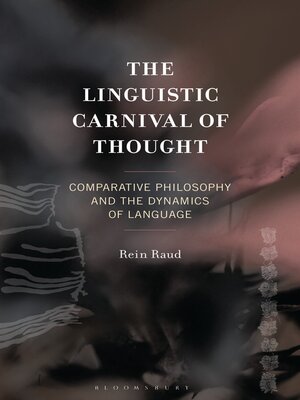The Linguistic Carnival of Thought
ebook ∣ Comparative Philosophy and the Dynamics of Language · Studies in Comparative Philosophy and Religion
By Rein Raud

Sign up to save your library
With an OverDrive account, you can save your favorite libraries for at-a-glance information about availability. Find out more about OverDrive accounts.
Find this title in Libby, the library reading app by OverDrive.



Search for a digital library with this title
Title found at these libraries:
| Library Name | Distance |
|---|---|
| Loading... |
The Linguistic Carnival of Thought: Comparative Philosophy and the Dynamics of Language argues that the practice of philosophizing is significantly influenced by linguistic structures. Against the widespread view that all languages are reducible to the same matrix on a deep-structural level, Rein Raud presents ample evidence to the contrary, demonstrating how different strategies of predication, postulation, negation, individuation, and so on vary greatly and present incompatible combinations in natural languages, which are nonetheless suitable for precise and rational argumentation.
This book compares the views of language presented by Plato, Kongzi/Xunzi, and Bhartrhari; discusses "pansemioticism," or the view that reality itself is significant (addressing Yijing, East Asian Buddhism, the Kabbalah, the philosophies of Peirce, Derrida, and others); juxtaposes the set-theoretical ontology of Badiou and the mereological worldview of Huayan Buddhism; and discusses various critiques of the idea of "truth" (Wittgenstein, Deleuze, Foucault) and a way to accommodate them through the logic of Dignaga, among other topics. With examples from languages and philosophical traditions across the world, the book is an ideal introduction to the problematic for monolingual speakers of English and a scintillating exploration for polyglots.
This book compares the views of language presented by Plato, Kongzi/Xunzi, and Bhartrhari; discusses "pansemioticism," or the view that reality itself is significant (addressing Yijing, East Asian Buddhism, the Kabbalah, the philosophies of Peirce, Derrida, and others); juxtaposes the set-theoretical ontology of Badiou and the mereological worldview of Huayan Buddhism; and discusses various critiques of the idea of "truth" (Wittgenstein, Deleuze, Foucault) and a way to accommodate them through the logic of Dignaga, among other topics. With examples from languages and philosophical traditions across the world, the book is an ideal introduction to the problematic for monolingual speakers of English and a scintillating exploration for polyglots.







